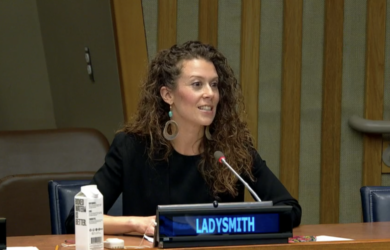
Michael Marin writes about how to reform the banking sector.
How do we prevent another financial crisis? Since the devastation that began with the collapse of the U.S. subprime mortgage market in 2007, a great deal of ink has been spilled trying to answer this question.
Unfortunately, most official accounts of the crisis, and how to avoid the next one, have missed the mark. They have overlooked the fundamental problem: a corporate governance model that the puts the private interest ahead of the public interest.
Financial institutions in most countries today are governed based on the theory of shareholder primacy. According this model, the institution’s management has one overriding duty: to maximize shareholder returns. True to its name, shareholder primacy puts shareholders in the driver’s seat; they get to choose the people who will run the financial institution for their benefit alone.
There are good reasons for supporting shareholder primacy. It is based on a healthy distrust of managers, who may be tempted to use the firm’s resources to pursue their own interests, rather than those of shareholders. Asking managers to balance the concerns of a number of different constituencies is just a license for them to abuse their power.
As a result, shareholder primacy tries to remove any ambiguity by making managers beholden to a single group – the firm’s shareholders. In addition to imposing legal obligations on directors and officers, today’s dominant corporate governance regime ties executive compensation to the share price. All of this is designed to align the interests of shareholders and managers.
In theory, this makes sense, but in practice it’s a recipe for crisis, specifically in the context of financial institutions. The business model of financial institutions is very different from that of an ordinary firm.
Basically, financial institutions profit from the “spread” between short- and long-term interest rates. In other words, they make money by lending at higher rates than they borrow. Thus, the best way for a bank to increase its profits is by increasing its “leverage” – that is, by making as many loans as possible.
But the greater the bank’s leverage, the greater its risks. This is because if the bank’s debtors begin to default, or if there’s a perception that they might, the bank’s creditors (its depositors) will come running for their money all at once; hence the expression “bank run”. During a run, the “mismatch” between the bank’s assets and liabilities leaves it strapped for cash, and can ultimately lead to insolvency and failure. This is precisely what happened to the likes of Northern Rock just a few years ago.
What does all this have to do with shareholder primacy? Since shareholders are interested in maximizing profit, they will encourage the financial institution, through its managers, to increase leverage. Given the legal obligations and financial incentives facing mangers today, they will likely oblige. If they don’t, the capital markets may see the firm as “undervalued”, making it a target for a hostile takeover bid, which, if accepted, will result in the management team being replaced by a more shareholder-friendly one.
Therefore, in a world where shareholders rule, the pressure on managers to satisfy the thirst for leverage and profit is tremendous.
We have known for decades, thanks to economists like John Maynard Keynes and Hyman Minksky, that financial institutions’ propensity for risk-taking is a key driver of economic instability. In order to maximize profit, banks look to progressively riskier assets, putting their faith in so-called “financial innovations”, which promise all the benefits of leverage without any of the risks.
For a time, rising asset prices validate bankers’ optimism, but eventually the bubble bursts, exposing it as nothing less than delusional. In the recent crisis, the innovations of choice were based on a method called securitisation, which in theory is supposed to distribute risk efficiently. In practice, however, securitisation turned out to be a “weapon of mass destruction”, as legendary American investor Warren Buffett put it.
The methods were new this time, but the pattern of behaviour was anything but. In the last five decades, we have seen repeated crises of this kind, albeit not of this magnitude. So why don’t we learn from history? Why don’t we heed the warnings?
The ideology of shareholder primacy has a lot to do with it. To begin with, during the boom, when shareholders are getting rich, the system makes it almost impossible for managers to buck the trend.
In addition, managers are not only expected to pursue shareholders’ economic interests, but their political ones as well. Not surprisingly, therefore, the financial industry is notorious for its lobbying activity. In the 1980s, the City of London pushed for the deregulation of the financial system. At the time, the reforms were dubbed the “Big Bang” due to the explosion in the capital markets that ensued; today the moniker is still appropriate, but for entirely different reasons…
As a result, those who would leave shareholder primacy in place and put their faith in regulation to stop the next crisis are mistaken. They do not account for the financial industry’s political influence, which has been used to weaken regulation or “capture” those who enforce it. And they are overconfident about the ability of regulators, regardless of their resources and independence, to keep up with financial innovation, especially given the unprecedented complexity and global scale of today’s financial system.
While stricter regulation – particularly with respect to capital requirements – is crucial, such reforms risk being undermined by the perverse incentives of shareholder primacy. A situation in which the regulatory system is butting heads with the corporate governance system is incoherent and unlikely to promote economic stability in the long term.
A final problem with shareholder primacy is that it results in the wrong kinds of people being appointed to serve as directors and officers of financial institutions. The skills and temperament that maximize shareholder profits conflict with those that promote economic stability. As a result, shareholders prefer dealmakers to caretakers.
True, directors and officers of financial institutions must pass the Financial Services Authority’s “fit and proper” test. But, as Lord Turner concluded in his review of financial regulation in the UK, these standards were poorly enforced in the years leading up to the crisis. This is because it was assumed – consistent with shareholder primacy – that financial institutions themselves were better placed to decide who should manage them. Not surprisingly, most bank executives didn’t understand the risks they were taking; some didn’t even have prior financial industry experience.
In order to prevent the next crisis, we need to do away with shareholder primacy for financial institutions, which are a special kind of company. We need a new corporate governance model that recognizes the essential role that financial institutions play in the wider economy and society. This means, at the very least, that their managers must have a legal duty to consider the public interest, and have the knowledge and temperament to discharge it accordingly.
*This article first appeared on the University of Cambridge website. Michael Marin [2011] has a Gates Cambridge scholarship to do an LLM at the University of Cambridge.Picture credit: Stuart Miles and www.freedigitalphotos.net.












